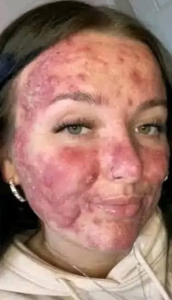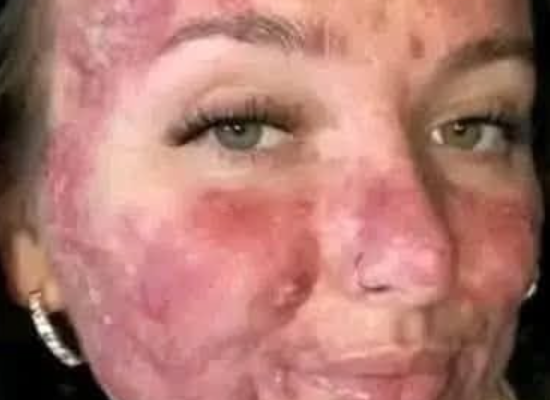“Her Body Was Itchy—He Thought It Was an Allergy. It Wasn’t.”
It started with something so small that neither of them paid it much attention.
“Do you think it’s the detergent?” Lily asked, scratching her forearm absently. Her skin was pink and slightly raised in patches.
Mark glanced over from the couch, sipping his tea. “Could be. I bought the store brand this time. You know, budget life.” He chuckled, but Lily didn’t smile.
“It’s not just that. My back too. And my legs,” she said, pulling up her pajama pants to show faint red welts on her calves.
He shrugged. “Maybe it’s seasonal. Pollen’s crazy this year.”
That night, she took an antihistamine and they both went to bed.
But the itching didn’t go away.
In fact, by the third day, it was worse. She woke up scratching so hard that she drew blood from her shoulder. The rash had spread, and now her skin looked blotchy, inflamed.
“It’s definitely an allergic reaction,” Mark said again, almost annoyed now. “You should just go to urgent care and get a steroid shot.”
Lily frowned in the mirror. Her face looked puffy, her eyelids red.
“I feel like my skin is crawling,” she whispered. “Like something’s under it.”
Mark tried to lighten the mood. “You sound like one of those WebMD horror stories.”
She didn’t laugh.
At urgent care, the nurse practitioner barely looked at her before writing a prescription.
“Looks like contact dermatitis. Probably from soap, lotion, detergent—any new products?”
Lily shook her head. “Nothing’s new. Except…”
She hesitated. She’d been feeling weird lately. Not just itchy—exhausted, spacey, a constant buzzing in her ears. But she didn’t want to sound dramatic.
“Just stress,” she muttered.
“Stress’ll do it,” the nurse agreed.
The steroids helped for two days.
Then everything got worse.
She woke up in the middle of the night drenched in sweat, skin burning. The itching had become unbearable. Her fingertips were swollen. Her nails had begun to crack at the edges. Her lips were chapped to the point of splitting.
Mark turned on the light and stared at her in horror. “Jesus, Lily.”
She was trembling, clutching her arms. “Something’s wrong. Something’s really wrong.”
Mark didn’t argue this time. They went straight to the ER.
After hours of waiting, bloodwork, and hushed nurses whispering behind the curtain, a doctor finally came in.
“I don’t want to alarm you,” he began, which of course alarmed both of them immediately, “but your white blood cell count is elevated. Extremely elevated.”
Mark’s jaw clenched. “Like… infection?”
“Possibly. But we’re also running autoimmune panels. And a few other tests.”
Lily looked from the doctor to her husband. “Other tests?”
The doctor met her gaze gently. “We’re checking for blood disorders. Possibly leukemia. Or other immune-related conditions. We won’t know until the panels come back.”
The next few days were a blur of hospital lights and cold hallways.
Lily was admitted. Her skin continued to worsen. Tiny blisters appeared under her arms and along her thighs. She lost patches of hair. Her gums bled when she brushed her teeth. Something was attacking her from the inside.
Mark stayed by her side, guilt weighing on him like bricks.
“I thought it was laundry soap,” he said one night, wiping her forehead. “I thought you just needed a Benadryl.”
Lily smiled faintly. “So did I.”
The final diagnosis came from a specialist flown in from the state capital.
A rare condition. Autoimmune. Stevens-Johnson Syndrome, triggered—ironically—by the very antihistamines she’d taken to treat the so-called allergy.
Her body had treated the medication as an invader and launched an immune war. Skin cells were dying rapidly. It was why she felt like she was burning alive.
The itching was just the beginning.
She was transferred to a burn unit, where they treated her blistered skin like that of a fire victim. Bandages, ointments, fluids.
Mark sat outside the room for hours at a time, staring into space.
He replayed the early signs over and over in his mind.
He’d brushed them off.
He’d told her it was just allergies.
He hadn’t listened.
Recovery was slow and brutal. She couldn’t walk for a week. Eating was painful. Her voice was barely a whisper.
But she lived.
When she was finally released, months later, she was thinner, paler, but alive. She had to wear special compression garments to protect her healing skin. She’d carry some scars for life.
Mark wheeled her out of the hospital, holding her hand.
“Don’t blame yourself,” she whispered, sensing his thoughts.
“I should’ve known,” he said. “I should’ve taken it seriously sooner.”
“You couldn’t have known,” she said. “But now we both do.”
A year later, Lily posted a photo to her blog.
It showed her walking—slowly but steadily—on a hiking trail near their home. She wore long sleeves and a hat, but she was smiling.
The caption read:
“It started with an itch. We thought it was nothing.
But it turned out to be everything.
Listen to your body.
Speak up when something feels wrong.
And when someone tells you they’re in pain—believe them.”


